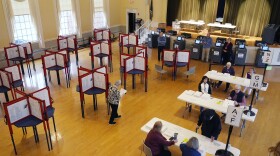-
Party candidates running for federal, state and county offices will have to obtain a set number of signatures to qualify for the June primary elections. The thresholds vary by office and it will be easier to make the March 16 deadline for those who have built organizational and volunteer networks.
-
That's significantly lower than during presidential years but was higher than the past two, referendum-only elections in the state.
-
Question 1 failed by large margins in southern and coastal areas but also struggled in some rural parts of western and central Maine.
-
The Wabanaki Alliance has come out in opposition to Question 1 on November’s ballot, warning that the Wabanaki nations would be harmed by changes to absentee voting and its exclusion of tribal IDs as a valid form of voter identification.
-
In late-September, 250 absentee ballots that were supposed to go to Ellsworth instead ended up in an Amazon box sent to a private home. Investigations into the incident are ongoing.
-
Mainers can begin to cast their ballot for the November election either in person or by mail.
-
The governor was responding to the Trump administration's latest lawsuit against Maine, this time seeking complete copies of the state's voter registration files.
-
Maine Secretary of State Shenna Bellows has rejected two demands from the DOJ to share complete copies of Maine's computerized voter registration rolls. The department's lawsuit, filed Tuesday, represents an escalation of the national tug-of-war between the Trump administration and states over voter data.
-
The Department of Justice says the detailed data is needed to ensure Maine is accurately maintaining its voter rolls. But Secretary of State Shenna Bellows, a Democrat, says the DOJ is overstepping its bounds as part of a "fishing expedition."
-
President Trump wants to "lead" an effort to bar mail-in voting and voting machines. Maine Secretary of State Shenna Bellows says both would be bad ideas.
Bangor Studio/Membership Department
63 Texas Ave.
Bangor, ME 04401
Lewiston Studio
1450 Lisbon St.
Lewiston, ME 04240
Portland Studio
323 Marginal Way
Portland, ME 04101
Registered 501(c)(3) EIN: 22-3171529
© 2026 Maine Public
63 Texas Ave.
Bangor, ME 04401
Lewiston Studio
1450 Lisbon St.
Lewiston, ME 04240
Portland Studio
323 Marginal Way
Portland, ME 04101
Registered 501(c)(3) EIN: 22-3171529
© 2026 Maine Public

Play Live Radio
Next Up:
0:00
0:00
Available On Air Stations
Scroll down to see all available streams.









